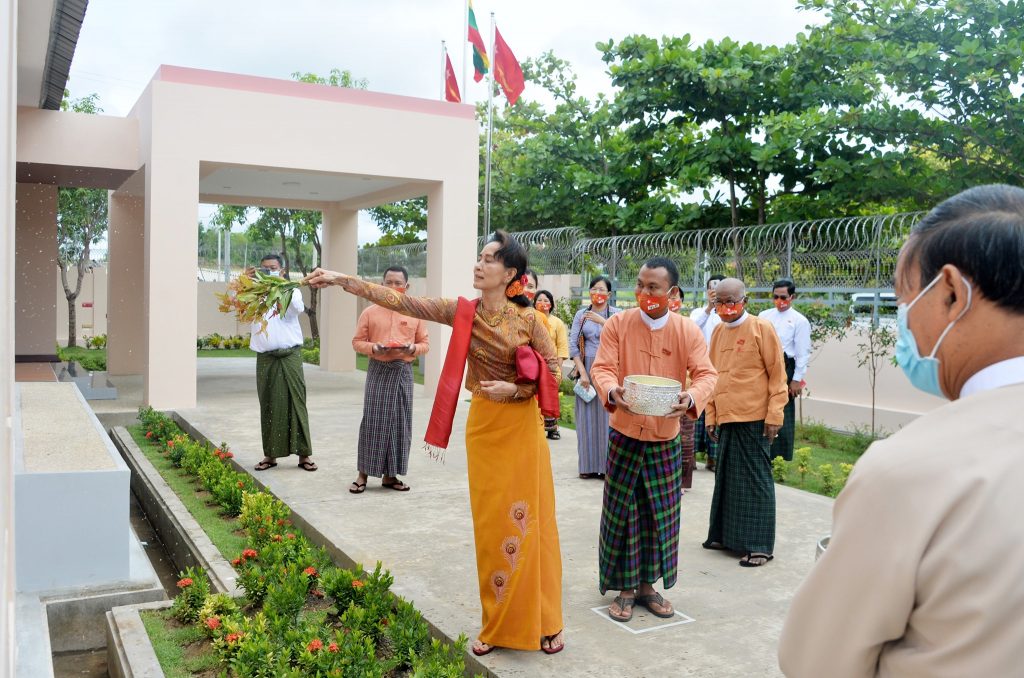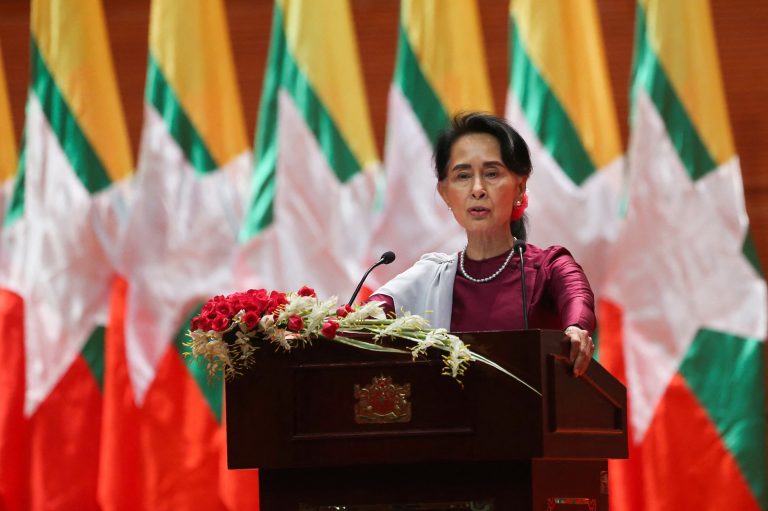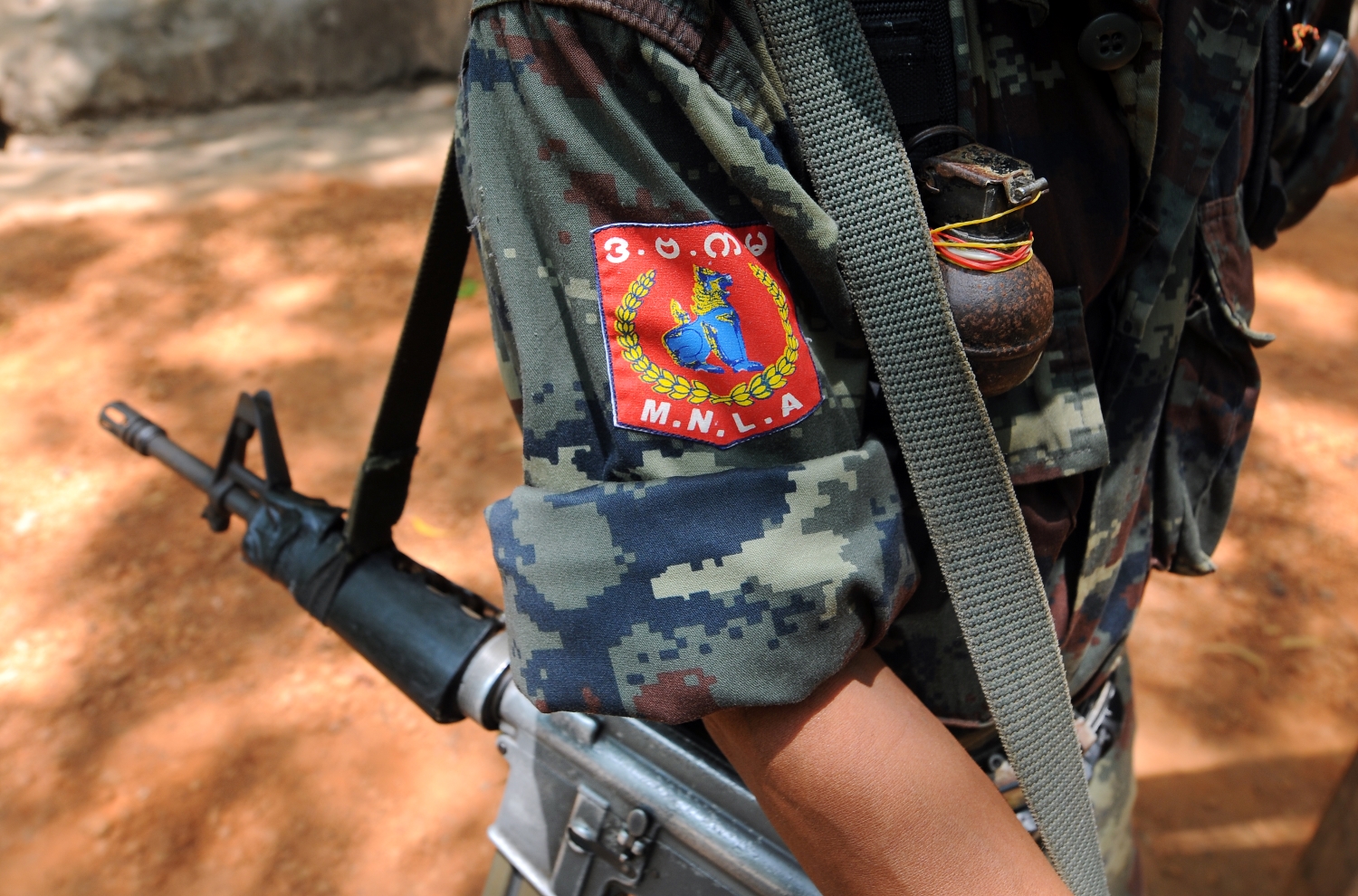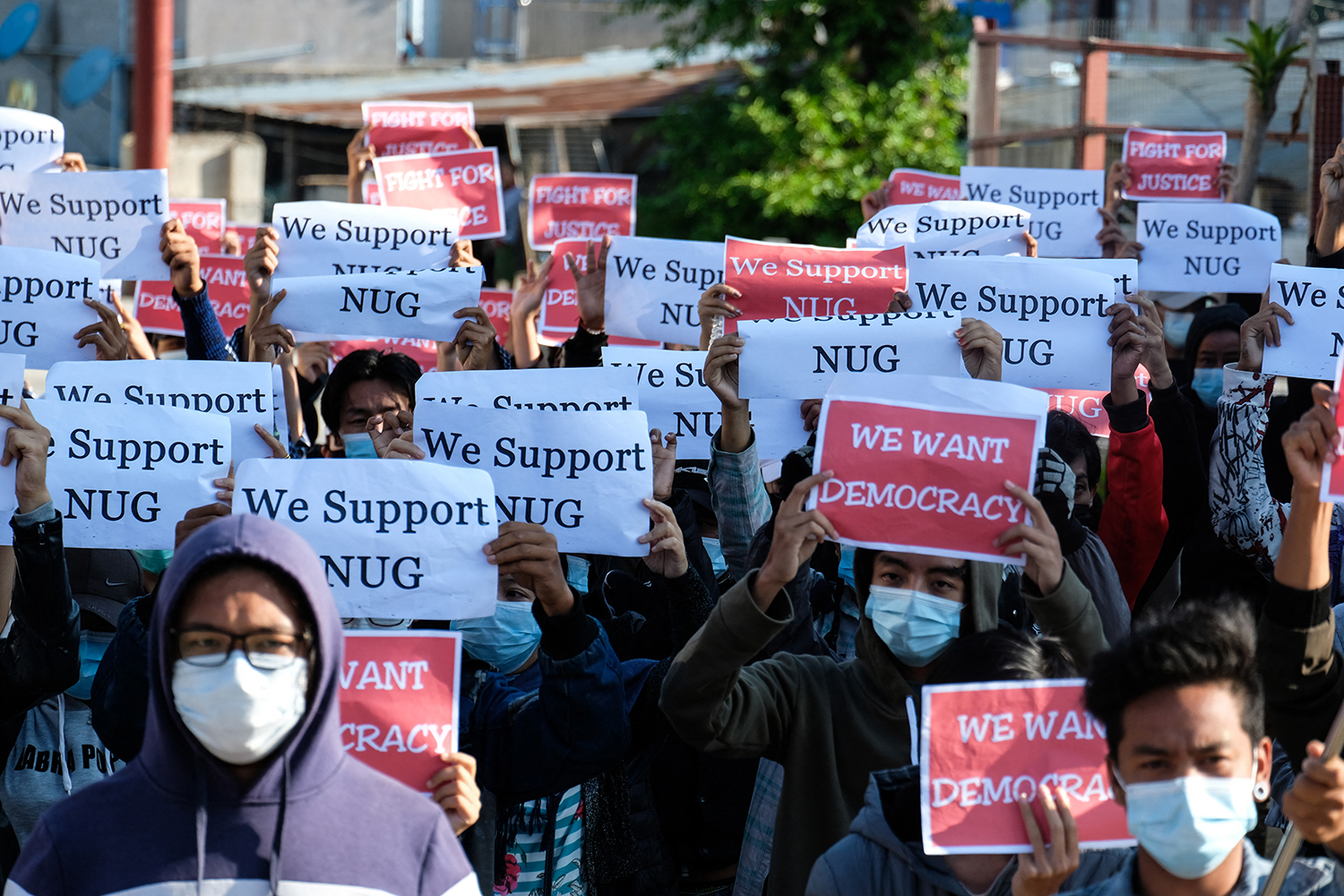Critics say new campaign rules favour the NLD by allowing government officials including Daw Aung San Suu Kyi to campaign before other candidates, but confusion over the constitution enabled the USDP to do the same in 2015.
By EI EI TOE LWIN | FRONTIER
To the casual observer, it probably looked like a fairly run-of-the-mill office opening ceremony, with dignitaries blessing the new building and cutting a ribbon as the audience clapped politely.
The presence of State Counsellor Daw Aung San Suu Kyi and President U Win Myint at the National League for Democracy branch opening in Nay Pyi Taw’s Ottarathiri Township on July 5 made it anything but ordinary, however.
Their appearance reflected growing tensions between the Union Election Commission and dozens of political parties over the conduct of this year’s vote, scheduled for November 8
Despite the former military government’s failure to honour the NLD’s election win in 1990, and its staging of an allegedly rigged poll that excluded the NLD in 2010, the 2015 election was largely praised by foreign and Myanmar observers and saw the NLD belatedly assume power. Most expect this year’s election to be a similarly open contest.
Already, though, the Union Election Commission’s rules have some wondering how free and fair this election will be.
After the UEC set the date for the election earlier this month, it issued a directive allowing members of the NLD government to begin campaigning from July 1.
All other candidates, however, will have to wait another two months before they are allowed to campaign. The UEC says it will accept candidate applications from July 29 to August 9, and will scrutinise them from August 11 to 17. Campaigning is expected to begin in early September and run for 60 days, as it did in the previous general election.
Allowing only union-level officials to begin campaigning before everyone else implicitly advantages the NLD, critics say.
The UEC was being “unfair”, said U Thein Tun Oo, a spokesperson for the military-aligned Union Solidarity and Development Party. “All candidates should have equal rights.”
He said the party is still formulating a response to the new policy.
Like the NLD, the USDP is aiming to contest the large majority of seats up for election this year.
U Tin Maung Oo, a former USDP member who now leads the Union Betterment Party’s campaign team for Yangon Region, was more guarded when asked to comment on the policy.
The UBP is led by former parliamentary speaker and ousted USDP chairman U Shwe Mann, a top general in the junta who broke ranks with the military to become a close ally of Aung San Suu Kyi under the previous USDP government.
“The new rules will give some candidates 67 more days to campaign than others,” said Tin Maung Oo. “I don’t want to say if this is fair or unfair, but the UEC and the government have a responsibility to hold free and fair elections.”
This is not the first time the UEC has been accused of pro-incumbent bias. The president has constitutional power to appoint UEC commissioners, including its chair, for a term coinciding with that of the elected government.
Critics have said this impugns the commission’s independence, and before it came to power the NLD regularly accused the UEC of pro-USDP bias. The 16-member body is currently chaired by U Hla Thein, who NLD president-elect U Htin Kyaw nominated in March 2016.
Regardless of who is allowed to campaign this year – and whenever they may start – all candidates will presumably have to abide by COVID-19 restrictions from the Ministry of Health and Sports, which still bans gatherings of more than four people.
Observers also noted that Aung San Suu Kyi, Win Myint and the rest of the NLD central executive committee were not wearing facemasks at the office opening ceremony on July 5.
The COVID-19 order, Tin Maung Oo said, essentially bans all campaigns for the time being.
“This should be clarified before the campaigns begin,” he said.

Constitutional confusion
Controversy over government officials campaigning in elections is not new and stems from an apparent contradiction in the 2008 Constitution.
Section 64 of the constitution bans the president and vice presidents from “party activities during their term of office from the day of their election”. Other sections also bar Union ministers, the attorney general, the auditor general and members of the Constitutional Tribunal from “party activities”.
In its announcement, the UEC cited section 7(b) of the Union Government Law, which gives these officials the right to conduct “party organisational works” immediately after the UEC declares that elections will be held. Neither the law nor the constitution defines what constitutes “party organisational works” or “party activities”.
The law, which was enacted by the military junta in October 2010, justifies this by referencing section 38(a) of the constitution: “Every citizen shall have the right to elect and be elected in accord[ance] with the law.”
In 2015, the election commission – which was then headed by a former general, U Tin Aye – allowed members of the USDP government to begin campaigning from July 8 on similar grounds.
Then-president U Thein Sein subsequently used the party logo during government events in Sagaing, Bago, Mandalay and Tanintharyi regions, but he generally stayed away from other party activities, such as office opening events or campaign rallies.
The NLD lodged a complaint with the UEC, arguing that this violated section 64 of the military-drafted charter, and the president had therefore also violated the presidential oath to “uphold and abide by the Constitution and its Laws”. The UEC did not respond to the complaint.
The NLD now finds itself in the opposite position, having declared on July 2 that the party’s top leaders – Win Myint and Daw Aung San Suu Kyi – will campaign for the NLD this year.
In response to criticism of the statement, NLD spokesperson Monywa Aung Shin said Aung San Suu Kyi and Win Myint were not campaigning as candidates but were instead “resuming party activities to prepare for the election”.
In 2015 they both won seats in the Pyithu Hluttaw. The NLD has not declared whether they will compete again this year. A parliamentary seat is not required, and would even need to be forfeited, for them to resume Union government positions in 2021.
Monywa Aung Shin said Win Myint and Aung San Suu Kyi will focus on three main activities: rebuilding the party, resolving internal problems and preparing the party’s election manifesto.
The NLD central executive committee is in the process of confirming candidates nominated by township branches last month. Monywa Aung Shin would not confirm whether Aung San Suu Kyi and Win Myint would be involved in this process.
Sai Ye Kyaw Swar Myint, executive director of Yangon-based election monitoring group the People’s Alliance for Credible Elections, said that it was a “controversial issue” that should be settled through a constitutional amendment.
“For now, we have to keep our eye on whether [members of the Union government] misuse their power, government property or government projects while they are campaigning,” he said.
Constitutional amendments are also needed to resolve the UEC’s lack of independence from the government, he added.
“If we don’t change the constitution, we’ll have the same problem every election.”
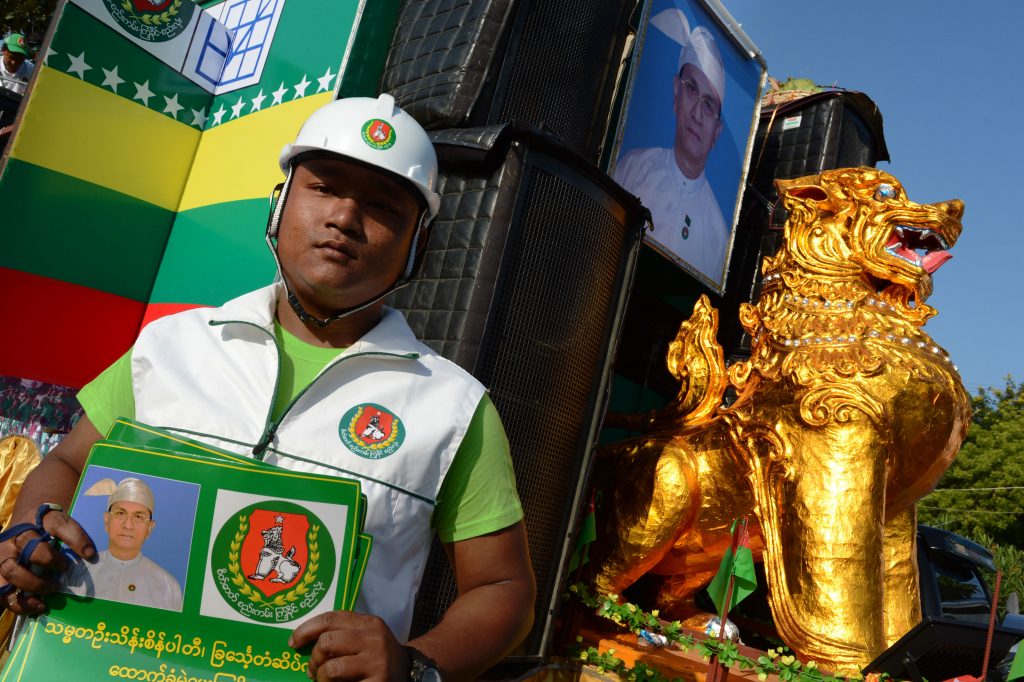
Time for change
Attempts were made during the previous USDP government to address the confusion over government officials campaigning. However, these were as much about internal power struggles within the USDP as a genuine attempt to reform the law.
For much of that government’s term, from 2011 to 2016, Thein Sein and Shwe Mann were locked in a struggle for control of the party.
In his 2018 book, former President’s Office minister U Soe Thane claimed that the Tatmadaw and representatives of the government and USDP agreed at a July 2, 2012, meeting to change section 64 of the Constitution so the president could take part in party activities.
However, Shwe Mann and senior party official U Aung Thaung backtracked on the agreement because they did not want to share power with Thein Sein, he wrote in Myanmar’s Transition and U Thein Sein: An Insider’s Account.
The incident set off the power struggle within the party, which was based on personal grudges, Soe Thane wrote.
In mid-2015, as the election approached and the battle for control of the USDP heated up, Shwe Mann as parliamentary speaker submitted a proposal to amend the Union Government Law to block the president, vice presidents and members of the government from campaigning, in line with the constitution.
The amendment passed the lower house despite opposition from the military and some USDP lawmakers, but was blocked in the upper house. In August 2015, the president and military moved against Shwe Mann, expelling him and his allies from the party in what was termed a “midnight coup”.
Although the NLD sided with Shwe Mann in trying to amend the Union Government Law and complained to the UEC about Thein Sein campaigning in 2015, it has made no move to amend the law since taking office.
In addition, neither section 64 nor the clauses banning other members of the government from taking part in “party activities” were included in the NLD’s proposed changes to the constitution. In March, the military used its 25 percent share of parliament seats to block the NLD-sponsored amendments, which require the backing of more than 75pc of MPs.
Asked about the attempt to change the Union Government Law in 2015, Tin Maung Oo, who was then a Shwe Mann-aligned USDP lawmaker, said only that the proposal had failed.
“Now we, the UBP, will have to run according to the law,” he said.


